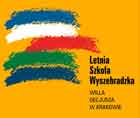
Pragniemy stworzyć atrakcyjną, alternatywną przestrzeń edukacyjną dla młodych ludzi z Europy Środkowej i Wschodniej, gdzie będą mogli dyskutować o współpracy europejskiej i regionalnej.
50 studentów, młodych naukowców, nauczycieli i dziennikarzy Czech, Węgier, Słowacji, Polski i innych krajów Europy Środkowo-Wschodniej będzie mogło pogłębić swoją wiedzę o ciągle zmieniającej się rzeczywistości politycznej, ekonomicznej i społecznej kontynentu, nawiązać międzynarodowe przyjacielskie kontakty oraz spotkać znakomitych europejskich ekspertów.
Termin składania aplikacji mija 30 kwietnia 2006.
Więcej informacji na stronie internetowej http://www.villa.org.pl/e_p_letnia.php
Visegrad Summer School
V edition
9-22 July 2006
aim:
The aim of the Visegrad Summer School is to provide a forum for the exchange of ideas and to create an alternative learning environment for young people from Central and Eastern Europe. The program is an opportunity for the participants to get acquainted with and discuss current social and security, economic, political and cultural issues. It is also an opportunity to learn about each other and start an international co-operation between the peoples and the countries.
people:
A group of 50 students, graduates, PhD researchers, young journalists and teachers from the Czech Republic, Hungary, Slovakia, Poland, Ukraine, Moldova and other Central and East European countries will deepen their knowledge and exchange ideas about the constantly changing political, social and economic situation on the continent, form international friendships and meet outstanding European experts. Thanks to a generous contribution from PAUCI, a group of 15 students from Ukraine, Moldova and Germany can be invited to join the program this year.
ideas and events:
The programme of the fifth edition of the Visegrad Summer School includes debates on: experiences that result from “being European”, democratic transition of East European countries, political perspectives for the United Nations, globalisation, problems of global security, regional partnerships and areas of cooperation. The historical and cultural context of Central Europe serves as a starting point for discussions on economics, politics, social issues as well as mass media, art and culture.
Intellectuals, scientists, politicians, representatives of business and non-governmental organisations, journalists and artists conduct seminars and workshops, hold lectures and lead debates.
Students are encouraged to present their country’s culture, heritage and traditions which helps to increase the knowledge of other participants about different countries. They organize themselves into working groups in order to develop their own projects aimed at furthering collaboration between them and their countries. Study visits and social events enrich the program with unforgettable experiences and ensure memorable moments for the students. All the activities are designed to enhance an atmosphere of integration, dialogue and co-operation between participants from different European countries.
experience:
The Visegrad Summer School is one of the most respected forms of education and co-operation for young people in Central and Eastern Europe. As former editions have shown, independent and innovative projects developed by students during the program prove the Visegrad Summer School to be a successful forum creating new platform of co-operation and enhanced dialogue between students, young researchers and NGOs from V4+ countries.
costs:
the organizers provide:
· all lectures, workshops and materials
· accommodation and board
· special events
· local transportation in Krakow
participants cover:
· travel costs to and from Krakow (costs of Ukrainians and Moldavians will be reimbursed up to an agreed amount)
· their own insurance
· registration fee of 30 EURO
Students from other EU countries and the USA are eligible to apply providing they cover the costs of their stay.
enrolment:
We are looking for active, open-minded and creative people. The working language of the School is English so good communication skills in English are essential.
Each candidate should provide a:
· letter of motivation explaining how he/she would benefit from the School
· completed application form
· detailed CV
· testimonial or references
The application should be emailed to:
school@villa.org.pl
and confirmed by post to:
Villa Decius Association
ul. 28 Lipca 17A
30-233 Krakow, Poland
Deadline for submitting applications: April 30th, 2006.
Accepted participants will be informed by May 31st , 2006.

